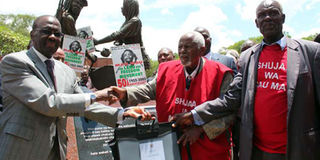Torture victims are crying out for justice

Chief Justice Willy Mutunga (left) hands over court files of the late Dedan Kimathi to Mau War Veterans Association Secretary General Gitu wa Kahengeri (centre) and chairman Kiburo Mburugo at freedom corner in Uhuru Park, Nairobi on April 4, 2016. Legal battles still pending as groups seek a share of Sh2.5 billion awarded to victims by the British government. PHOTO | ROBERT NGUGI | NATION MEDIA GROUP
What you need to know:
- Many victims of torture have been seeking justice unsuccessfully despite the fact that President Uhuru Kenyatta has apologised to those affected by the persecution and torture of past regimes.
- Dr Mutunga has also apologised for the many injustices that past officials of the Judiciary committed against many Kenyans, especially those seeking change.
- It is, therefore, ironical that the courts have denied that there was torture by police, prisons, and other security agencies at Freedom Corner, in police cells, at Lake Nakuru Game Reserve, in prisons and detention centres at Manyani, Naivasha, Shimo la Tewa, and Kamiti.
- The Judiciary has only admitted to torture at Nyayo House and G Block of Kamiti Prison.
- For the sake of justice and as a victim of detention, the Chief Justice should help to clarify whether he and others suffered torture in detention and other prisons outside Nyayo House and G Block of Kamiti Prison.
From being a victim of injustice to a dispenser of justice, I hope that before he retires, Chief Justice Willy Mutunga will help clarify matters of torture, whose termination we fought so hard for before and after the second liberation.
Twenty-one years ago, I heard my mother’s scream against injustice when I was convicted and sentenced to four years in prison and six strokes of the cane for a fabricated charge of robbery with violence.
On April 15, 2016, I once again heard my mother’s scream against injustice when her plea for redress for the torture she suffered at Uhuru Park 24 years ago when police attacked the mothers of political prisoners.
It is not only my mother who is screaming for lack of justice in our courts; there is a general feeling among many Kenyans that, despite the reforms, justice in our courts is just as inaccessible today as it was under Kanu.
Right or wrong, this impression cannot be wished away and there is an urgent need for a national debate on the state of the Judiciary.
Under Kanu’s one party-dictatorship, it was precisely lack of this debate that transformed the Judiciary into a tool of oppression rather than an instrument of liberation.
Shielded from criticism, what principles of the law did the Judiciary violate to get where it is today?
In the play, Antigone, by Sophocles, King Creon ordered Polynices, his political enemy who had died in battle, to be left unburied in the fields to be eaten by dogs.
But Polynices’s sister, Antigone, disobeyed the King’s edict and buried her brother’s body. When asked why she had broken the law, Antigone answered: “I buried my brother under the laws of God that are superior to the laws of the king.” The laws of God should always guide the betterment of the laws of man.
Solomonic wisdom should always put truth above everything else. Any interpretation of the law and evidence that ignores the truth or is polluted by bias can never deliver justice.
SEEKING JUSTICE
Many victims of torture have been seeking justice unsuccessfully despite the fact that President Uhuru Kenyatta has apologised to those affected by the persecution and torture of past regimes.
Dr Mutunga has also apologised for the many injustices that past officials of the Judiciary committed against many Kenyans, especially those seeking change.
It is, therefore, ironical that the courts have denied that there was torture by police, prisons, and other security agencies at Freedom Corner, in police cells, at Lake Nakuru Game Reserve, in prisons and detention centres at Manyani, Naivasha, Shimo la Tewa, and Kamiti.
The Judiciary has only admitted to torture at Nyayo House and G Block of Kamiti Prison.
For the sake of justice and as a victim of detention, the Chief Justice should help to clarify whether he and others suffered torture in detention and other prisons outside Nyayo House and G Block of Kamiti Prison.
Courts have dismissed petitions of torture made 20 years ago on the grounds that they are time-barred.
British courts have admitted Mau Mau petitions against torture by British government officials more than 60 years ago. It is a violation when human rights petitions are denied urgency in courts.
When the Chief Justice says we have a bandit economy, he must also admit that there is discrimination and banditry in the Judiciary when citizens and the poor are shunned in favour of the State and the rich.
How else can one explain why poor people’ cases take long to be determined?
How can Kenyans have confidence in the Judiciary when similar evidence, circumstances, and laws lead to different judgments in different cases?
Can the Judiciary accept that it is fallible and respond to criticism from Wanjiku?
Mr Wamwere is a former MP for Subukia. [email protected].





